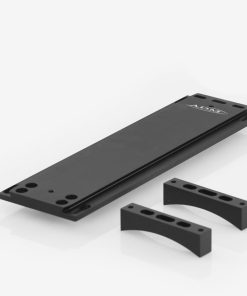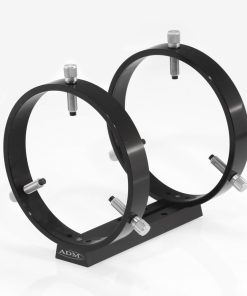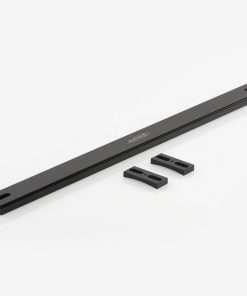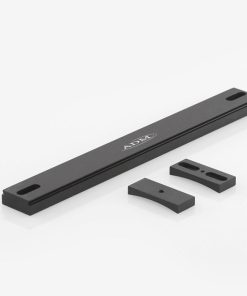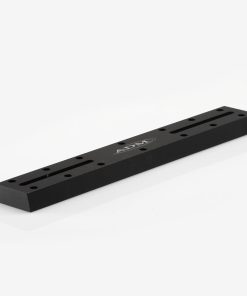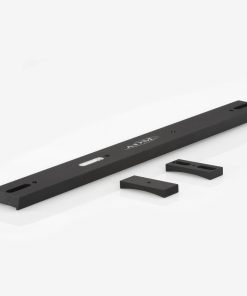Meade 8 Inch LX200-ACF Advanced Coma Free Telescope – No Tripod – 0810-60-03N Meade
$ 3.999,99 $ 1.000,00
Meade 8″ LX200 Advanced Coma-Free Telescope without Tripod
The most widely used research telescope on earth now comes with the most advanced optical system. Nearly every observatory reflector in the world uses an aplanatic (coma-free) optical system like the Ritchey-Chrétien (RC), including NASA’s Hubble Space Telescope. Now you can own optics similar to what the professionals use. Meade’s LX200-ACF brings Advanced Coma-Free (ACF) optics within reach of aspiring astronomers everywhere.
The LX200-ACF includes all the field-proven features of the LX200, including GPS, Primary Mirror Lock, Oversized Primary Mirror, SmartDrive™, Smart Mount™, AutoStar® II, and more. Plus, the LX200-ACF comes with observatory-class optics and a Series 4000 26mm Super Plössl eyepiece. The new LX200-ACF: It’s the biggest news in astronomy since, well, the LX200.
The “Advanced” in Advanced Coma-Free
A traditional Ritchey-Chrétien (RC) is a type of reflector that delivers a coma-free, flat field of view via hyperbolic primary and secondary mirrors. RC telescopes (from a variety of manufacturers) are found in most of the world’s top observatories and NASA’s Hubble Space Telescope. Because the mirrors in these telescopes have always been very expensive to make, few amateur astronomers could enjoy them. Fortunately, Meade engineers developed a radical new Advanced Coma-Free design by combining a hyperbolic secondary mirror with a corrector-lens-and-spherical-primary-mirror combination that performs as one hyperbolic element. This ACF design produces a coma-free, flat field of view that rivals traditional RC telescopes at a fraction of the cost. The design even eliminates diffraction spikes and improves astigmatism, both of which are inherent in the traditional ACF design. When reviewing Meade’s LX200-ACF Advanced Coma-Free, Sky and Telescope magazine said, ” It does indeed perform like a Ritchey-Chrétien. The difference between the off-axis images (compared to a Schmidt-Cassegrain) was dramatic, to say the least.”
f/10 Advanced Coma-Free Optics
Building from a classic RC design, Meade has created a new design with the same coma-free pinpoint star images and flatter field that discerning astrophotographers and most professional observatories have come to expect from classic Ritchey-Chrétien optics. Meade’s Advanced Coma-Free system also reduces astigmatism and eliminates diffractions spikes found in classical RCs. The LX200-ACF is the perfect platform for the demanding researcher and imaging enthusiast with telescopes available in apertures of 8 inches, 10 inches, 12 inches, 14 inches and 16 inches.
The UHTC Advantage
Meade Ultra-High Transmission Coatings (UHTC)are an amazing scientific breakthrough that increases brightness by the equivalent of nearly an inch of aperture (depending on scope size). These coatings are exclusive to Meade and make a real difference over competing scopes. Image brightness is increased by 15% over standard coatings.
Meade High Precision Pointing HP Feature
This feature is most helpful to astrophotographers interested in imaging objects too faint to be confirmed with the naked eye. Or those who want to place an item dead center on a very small CCD chip. When you turn this feature on and ask the scope to slew to an object, the scope will first slew to a star right next to the object and ask you to center that star perfectly. The star is likely to be perfectly centered already (that’s how accurate Meade telescopes are). But once you have confirmed the star’s precise location, the scope will slew to the nearby deep sky object and place it exactly in the center of your field of view. For normal observing, this level of precision isn’t necessary. But HPP gives you the confidence to kick off a two-hour long imaging sequence without even visually confirming a faint object’s existence!
More Advanced Features from Meade
- Primary Mirror Lock – Locks the mirror in place preventing movement during long-exposure astrophotography.
- Smart Drive – Provides permanent periodic error correction (PPEC) on both axes by learning and averaging error over the course of one or more training periods, thereby minimizing guiding corrections during long-exposure photographs. PPEC is available on both axes and functions in both polar and altazimuth modes.
- Sony GPS Receiver Sensor – automatically inputs precise time, date, and geographical location to help quickly and precisely align the telescope.
- AutoStar II Controller – features “Hot Keys” for quick access to a 145,000 celestial object database. AutoStar II can be updated with the latest software upgrades, guided tours and timely objects like comets free at meade
Quick Shipping and Professional Packaging
Due to our longstanding partnership with UPS FedEx DHL as well as other major international carriers, we are able to provide various shipping options. Our warehouse personnel are well trained and will be able to pack your goods in accordance with the exact and precise specifications. Your goods are thoroughly checked and securely secured prior to shipment. Everyday we deliver hundreds of packages to our customers from all over the world. Our determination to be the biggest online retailer in the world is shown by this. The warehouses are located situated in Europe in the same way as they are in the USA.
Note: Orders containing multiple items will have a separate processing period for each item.
We will carefully examine all products before they are shipped. Today, the majority of orders will be delivered within 48 hours. The delivery time will be between 3-7 working days.
Returns
We don't manage the stock at our warehouse and factory. The actual inventory may fluctuate at any time. It's possible that you may not receive your order once it's been placed.
Our policy is for 30 days. We are unable to return or exchange your purchase after 30 days since the purchase.
In order for your item to be eligible for return the item must not be opened and in the condition you received it. It must also remain in the original packaging.
Related products
Telescope Accessories
Telescope Accessories
Astrozap Aluminum Dew Shield for Celestron 14″ EdgeHD SCT – AZ247 Astrozap
Telescope Accessories
ADM Accessories Vixen Style Dovetail for Celestron 9.25″ SCT – VC925 ADM
Telescope Accessories
ADM Tripod Knob Set for Celestron CGEM DX Mount – CGEM-DX-TKS ADM
Telescope Accessories
Telescope Accessories
AstroZap 10″ Dobsonian Telescope Light Shield – AZ1202 Astrozap
Telescope Accessories
ADM Accessories Vixen Style Universal Dovetail Telescope Mounting Bar – 14″ Long – VDUP14 ADM
Telescope Accessories
ADM Accessories Tripod Knob Set for Losmandy G11 & Celestron CI700 Mounts – Orange – TKS-OR ADM
Telescope Accessories
ADM V Series Universal Dovetail with 150 mm Rings – VDUPR-150 ADM
Telescope Accessories
ADM V Series Universal Dovetail with 125 mm Rings – VDUPR-125 ADM
Telescope Accessories
ADM V Series Dovetail Plate for Celestron 9.25″ SCT – Orange – VC925-O ADM
Telescope Accessories
ADM Accessories CGEM Knob Upgrade – Two Orange Anodized Rosette Saddle Knobs – CGEM-SAD-OR ADM
Telescope Accessories
Telescope Accessories
Telescope Accessories
ADM Accessories Tripod Knob Set for Losmandy G11 & Celestron CI700 Mounts – Red – TKS-RE ADM
Telescope Accessories
ADM Accessories Vixen Style Dovetail for Meade 10″ SCT – VM10 ADM
Telescope Accessories
Telescope Accessories
ADM Replacement Spreader Bar Knobs for Celestron Advanced VX Mount – VX-SB ADM
Telescope Accessories
ADM Accessories Vixen Style Universal Dovetail Telescope Mounting Bar – 11″ Long – VDUP11 ADM
Telescope Accessories
ADM Accessories Vixen Style Dovetail for Celestron 11″ SCT – VC11 ADM
Telescope Accessories
ADM Accessories CGEM Knob Upgrade – Two Orange Anodized Spreader Bar Knobs – CGEM-SB-OR ADM
Telescope Accessories
ADM Accessories CGEM Knob Upgrade – Orange Tripod Knob Set – CGEM-TKS-OR ADM
Telescope Accessories
ADM V Series Dovetail Bar for Celestron 8″ SCT – Extra Long – VC8-XL ADM
Telescope Accessories
ADM Accessories Tripod Knob Set for Losmandy G11 & Celestron CI700 Mounts – Blue – TKS-BL ADM
Telescope Accessories
Telescope Accessories
ADM Accessories Vixen Style Universal Dovetail Telescope Mounting Bar – 7″ Long – VDUP7 ADM
Telescope Accessories
ADM Tripod Knob Set for Celestron CGE Pro Mount – CGE-PRO-TKS ADM












